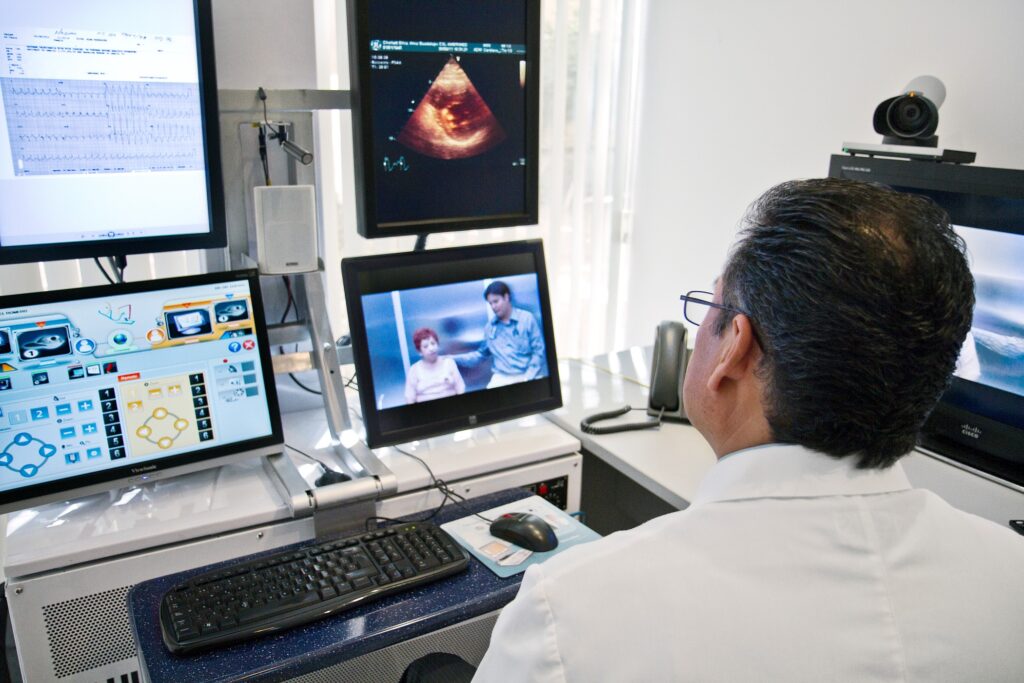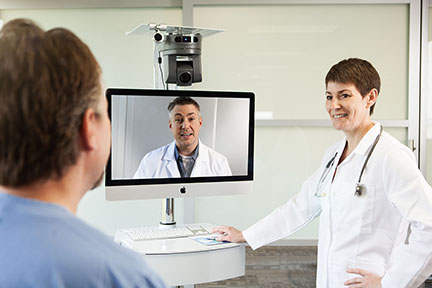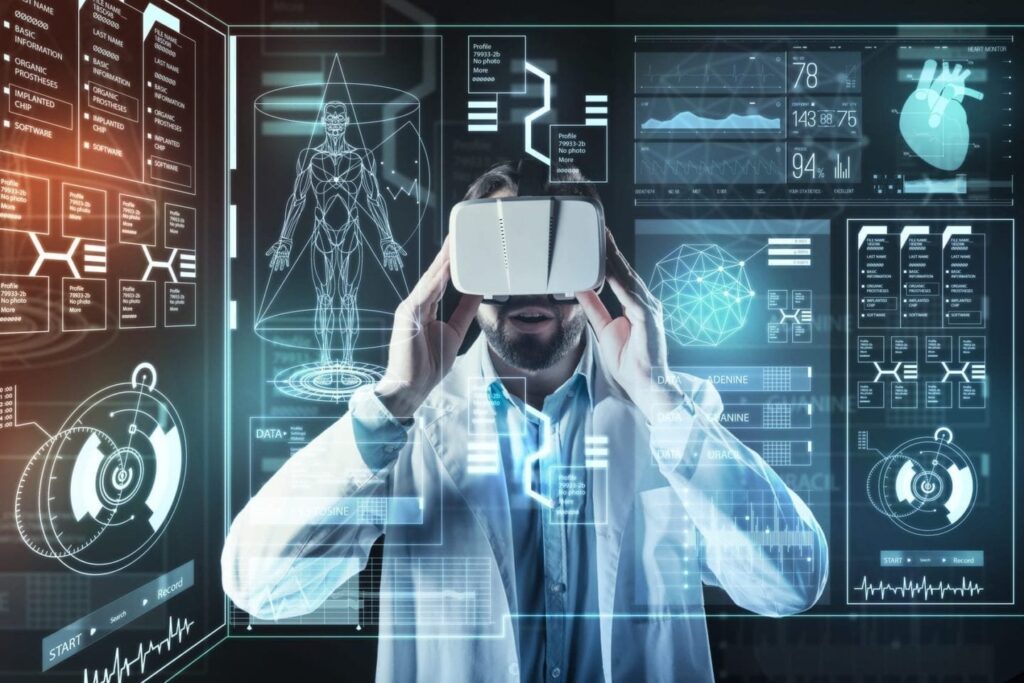Table of Contents
Introduction
Rapid technology breakthroughs are causing a fundamental upheaval in the healthcare sector. From AI-powered diagnostics to telemedicine, technology is reshaping how we approach medical care, improving patient outcomes, and streamlining healthcare processes. In this blog, we’ll explore ten significant ways technology changes healthcare, supported by case studies, a market revenue matrix, and answers to frequently asked questions about advanced medical technologies.

1. Artificial Intelligence in Diagnostics
Artificial intelligence (AI) has completely changed the game regarding medical diagnostics. AI algorithms can analyze medical images, such as X-rays and MRIs, with remarkable accuracy, assisting doctors in diagnosing conditions like cancer, heart disease, and neurological disorders. For example, Google’s DeepMind has developed an AI system that can detect over 50 eye diseases with an accuracy comparable to that of leading experts.
Case Study:
The Moorfields Eye Hospital in London collaborated with DeepMind to implement AI in eye disease diagnosis. The results showed that the AI system could diagnose complex eye conditions in seconds, significantly reducing the time required for treatment planning.
2. Telemedicine: Remote Healthcare Access
Telemedicine has gained widespread adoption, especially during the COVID-19 pandemic, enabling patients to consult with healthcare professionals remotely. This technology eliminates geographical barriers, providing access to quality healthcare for individuals in rural and underserved areas.
Case Study:
Teladoc Health, a global leader in telemedicine, reported a 40% increase in telehealth visits during the pandemic. Their platform allowed patients to consult doctors online, leading to a 25% reduction in emergency room visits.

3. Wearable Health Devices
Wearable technology, such as smartwatches and fitness trackers, is revolutionizing how individuals monitor their health. These devices track vital signs like heart rate, blood pressure, and sleep patterns, enabling users to manage their health proactively.
Market Revenue Matrix:
The wearable health device market is expected to reach $61.4 billion by 2025, driven by increasing consumer awareness of personal health management.
4. Electronic Health Records (EHRs)
Electronic Health Records (EHRs) have replaced paper-based medical records, providing a centralized, digital repository of patient information. EHRs improve the efficiency of healthcare delivery by allowing instant access to patient history, lab results, and treatment plans, reducing the likelihood of medical errors.
Case Study:
The Mayo Clinic implemented an EHR system that streamlined patient care by reducing redundant tests and improving communication among healthcare providers, leading to a 15% increase in patient satisfaction.
5. 3D Printing in Healthcare
3D printing is revolutionizing the production of medical devices and prosthetics. Custom-made implants, surgical instruments, and even human tissues can be produced using 3D printing technology, offering personalized solutions for patients.
Market Revenue Matrix:
The global 3D printing in the healthcare market is projected to reach $4.5 billion by 2026, driven by advancements in bioprinting and the increasing demand for customized medical solutions.

6. Robotic Surgery
Robotic surgery is another significant technological advancement in healthcare. Robots assist surgeons in performing minimally invasive procedures with precision and control, reducing recovery times and minimizing surgical risks.
Case Study:
The Da Vinci Surgical System, a leading robotic surgery platform, has been used in over 6 million surgeries worldwide, demonstrating a 20% reduction in surgical complications compared to traditional methods.
7. Blockchain for Secure Patient Data
Blockchain technology is being explored for its potential to secure patient data and ensure privacy. By providing a decentralized and tamper-proof system for storing health records, blockchain can enhance data security and patient trust.
Market Revenue Matrix:
The healthcare blockchain market is expected to grow at a CAGR of 72.8%, reaching $1.7 billion by 2028, as healthcare organizations seek more secure ways to manage patient data.
8. Virtual Reality (VR) in Medical Training
Virtual Reality (VR) is being used in medical training to simulate real-life scenarios, allowing medical students and professionals to practice surgeries and procedures in a risk-free environment. VR enhances the learning experience by providing immersive and interactive simulations.
Case Study:
The Cleveland Clinic partnered with a VR company to develop a VR-based medical training program. The program reduced training time by 30% and improved the retention of medical procedures by 40%.
9. Genomics and Personalized Medicine
Advancements in genomics have paved the way for personalized medicine, where treatments are tailored to an individual’s genetic makeup. This approach increases the effectiveness of treatments and reduces the risk of adverse reactions.
Market Revenue Matrix:
The global personalized medicine market is expected to reach $3.18 trillion by 2025, driven by the increasing adoption of genomic technologies in clinical practice.
10. Nanotechnology in Drug Delivery
Nanotechnology is being utilized to develop targeted drug delivery systems that deliver medication directly to affected cells, minimizing side effects and improving treatment efficacy. This technology holds promise for treating conditions like cancer and neurological disorders.
Case Study:
A biotech company developed a nanotechnology-based drug delivery system for cancer treatment. The system showed a 50% increase in drug efficacy and reduced the side effects typically associated with chemotherapy.
Conclusion
Technology is undeniably transforming the healthcare industry, offering innovative solutions that enhance patient care, streamline medical processes, and improve outcomes. From AI-powered diagnostics to personalized medicine, these advancements are paving the way for a healthier future. As technology continues to evolve, the healthcare sector must adapt and embrace these innovations to provide the best possible care for patients worldwide.
What are the advanced technologies in healthcare?
Advanced technologies in healthcare include AI in diagnostics, telemedicine, wearable health devices, electronic health records (EHRs), 3D printing, robotic surgery, blockchain for secure patient data, virtual reality (VR) in medical training, genomics, and nanotechnology in drug delivery.
What is advanced medical technology?
Advanced medical technology refers to innovative tools, devices, and systems that enhance the diagnosis, treatment, and management of medical conditions. These technologies include AI, robotics, 3D printing, and genomics, which contribute to improved patient outcomes and healthcare efficiency.
What is the best course in health technology?
The best course in health technology depends on your career goals and interests. Popular options include Biomedical Engineering, Health Informatics, Medical Laboratory Science, and courses in AI and machine learning for healthcare. These courses provide a strong foundation in the technologies driving modern healthcare.